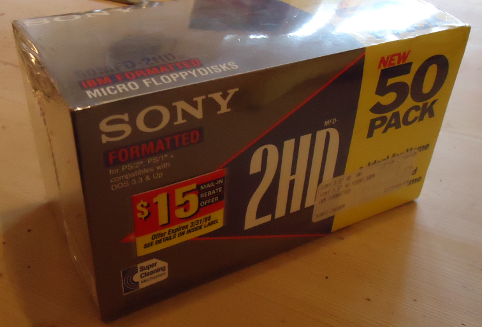Proper legacy headaches
09 January 2013Last week a friend of mine wanted me to get data off an old computer, which to my knowledge had not been switched on for around three years. I am not sure why I agreed to do such a thing at a time when most of my equipment was no longer in Bristol, especially when I realised how much of a rust-bucket I was dealing with. Nevertheless I did deal with it, and having gone through with it, it makes a good story.
This'll be easy..
My first line of action was one that I had been doing a lot recently with a stack of my own EIDE drives: slotting them into my EIDE caddy, then reading them using my Linux desktop. EIDE is slightly annoying in that it does not allow hot-swap, but that is a minor issue. This particular drive was obviously recognised, as it was listed on the BIOS screen, but that was as far as it got. Obviously some failsafe system had kicked in and halted the system. My friend took the drive away to work and it was allegedly "unlocked", which as far as i can tell consisted of changing the EIDE jumper settings. This doesn't actually matter when a drive is the only one on an EIDE channel, so it made no difference anyway...damn
Plugging the drive back into the old PC from whence it came, and it was able to boot up into Windows. More specifically Windows95. My next move of doing a copy using a Linux rescue CD lasted about as long as it took to realise the CD-ROM drive was non-bootable. And typical of a system of this age, it had other disadvantages. It was a P133, which suggests it was made circa 1995, and it had neither USB ports or a network connection. For some reason sticking in a network card caused issues with the graphics card, and I suspect Windows95 would not have been able to use it anyway. Certainly not without the driver disks.Scraping the barrel..
Since I was going back to Hertfordshire for a few days I decided to take the drive with me and try it in an older system of mine. To be fair this old system (since disposed of, with some regret) I suspect has its own hardware problems, but it became apparent that the constant hard lock-ups would make piecemeal copying too long-winded. In hindsight it would have been better if I tried using network rsync to another system than copying to a memory stick (hard lock-ups do wonders for file-system consistency, so all your supposedly copied files disappear), but by this point I was too pissed off to wire it all up. I had got Desktop and My Documents, but that still left the entire D drive. Even though it was a non-system partition, I doubt that section of the disk was in significantly better state (knackered hard drives tend to have localised problems).The cobwebs really do show
I had thought of plugging one of my old drives into my friend's PC, but considering the system was using FAT16, I had the suspicion that it was probably running a revision of Windows95 that did not have FAT32 support (that came in OSR2, released mid-1996). The smallest drive I could find that was not plumbed into a system turned out to be 8GB, and then it dawned on me that even this size a PC BIOS of this age would would be too much for a system of this age. It was too late in the day to mess around with solutions with known pitfalls.Last-chance saloon
I did not want it to come to this, but looking at the selection of available hardware interfaces, I did not have much choice. RS232. In terms of speed this competes with floppy disks, and even then its only advantage is not needing to keep swapping disks. Of course finding a sane Windows-based serial terminal program that supports file transfer is one thing. Finding one that is compiled so that it can be used with Windows95 (ie no .NET) is another. I settled on a fork of PuTTY. Just to complicate things, the hard drive in question was also a little full, so it was not quite as simple as zipping everything up and just letting ZMODEM churn away overnight. And as typical with non-technical people it is nigh on impossible to beat out of them any sort of prioritisation that does not distil down to "Grab everything". using a potentially dying hard drive as scratch space is asking for trouble.LePutty threw a DLL error anyway, and in hindsight it was probably Winsock being missing. It is possible the system had not even been used for dial-up internet, and Windows95 does not install networking stuff by default. In hindsight I should have tried one of the other terminal programs I had downloaded, but by this point I had enough. Floppy disks it is:

Of the whole experience, the lack of networking support was the biggest shock. Headaches related to getting data off old systems is why I built myself a dedicated file-server, and then copied data off many of my older computers onto it.